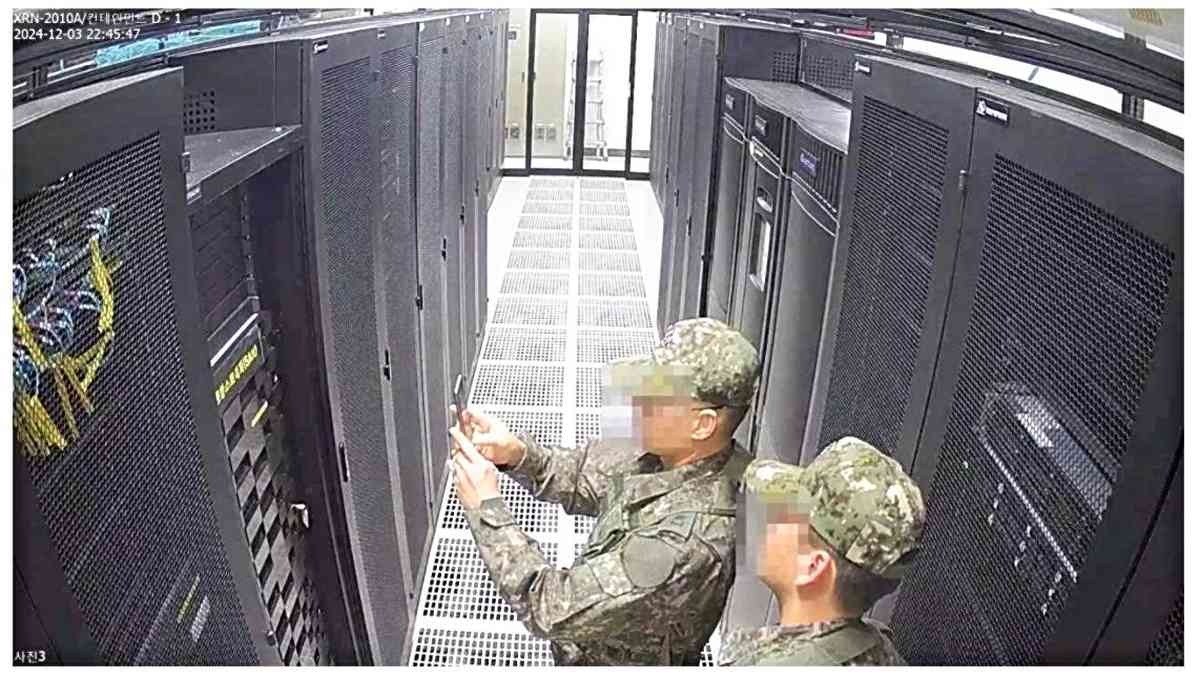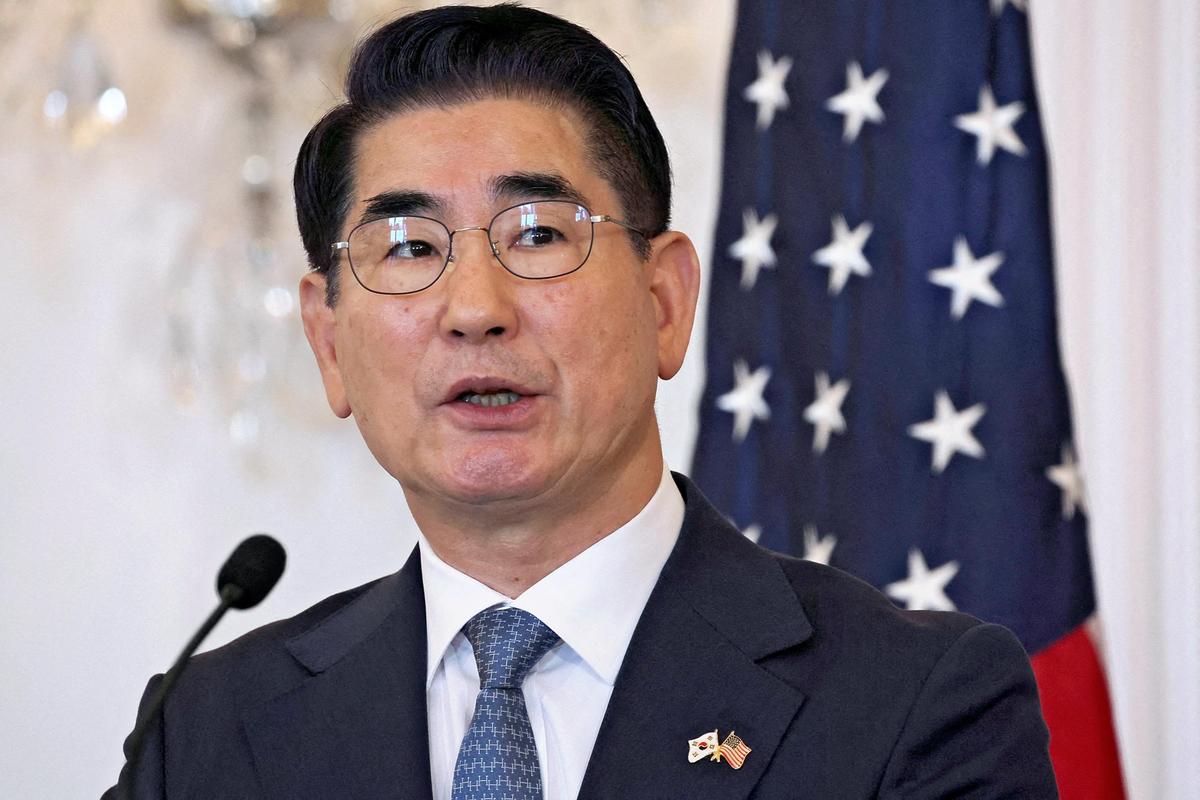Troops Sent to S. Korea Election Commission HQ During Martial Law; Election Fraud Verification Claimed as Motive

Security camera footage taken on Tuesday night shows soldiers who were deployed to enforce martial law inside the National Election Commission’s headquarters in Gwacheon, Gyeonggi Province, filming a server in the computer room.
16:27 JST, December 7, 2024
SEOUL — The National Election Commission of South Korea unveiled Friday that about 300 troops were deployed to its buildings, including its headquarters in Gwacheon, Gyeonggi Province, on the outskirts of Seoul on Tuesday night when South Korea’s President Yoon Suk Yeol declared martial law.
This number surpassed the approximately 280 soldiers who were deployed to the National Assembly in Seoul on the same night, indicating that the election commission was the main target in the military mission.
Former Defense Minister Kim Yong-hyun, who recommended Yoon declare emergency martial law, said when asked by a reporter of SBS on Thursday that the dispatch of troops to the election commission’s headquarters was to determine the necessity of an investigation into allegations of fraud regarding the general election held in April, in which the leftwing opposition secured a landslide victory.

Former South Korean Defense Minister Kim Yong-hyun
In his remarks made when he declared emergency martial law on Tuesday, Yoon accused the opposition of paralyzing the nation’s judicial administration systems through legislative dictatorship.
This indicates that the unexpected declaration was aimed at proving by iron-fisted tactics that the opposition had gained a majority in the National Assembly through illegal means.
Kim is one year Yoon’s senior and attended the same high school. Both are hardliners against North Korea. After Kim was hastily promoted from the head of the Presidential Security Service to defense minister in August, the martial law plan had reportedly been crafted together with a limited number of close aides.
According to the Dong-A Ilbo and other South Korean newspapers, the cabinet members who attended the cabinet meeting held at the Presidential Office prior to the martial law declaration on Tuesday evening were not informed in advance.
Prime Minister Han Duck-soo and Foreign Minister Cho Tae-yul opposed the declaration, but Yoon pushed it through.
Planned in advance?
In a statement issued on Friday, the election commission said that troops occupied the commission headquarters for about 3 hours and 20 minutes.
The mobile phones of five people who were on duty at the headquarters that night were seized, but no internal documents were removed by the troops, the statement said.
Lawmakers from the Democratic Party, the largest leftwing opposition party, on Friday unveiled the results of their analysis of security camera footage taken in the commission’s headquarters, revealing that troops entered the building and filmed the server in the computer room that manages the electoral register.
The troops entered the building at around 10:30 p.m. on Tuesday, immediately after Yoon’s declaration of martial law, indicating that it was planned meticulously.
It is customary for the chairperson of the National Election Commission, its top official, to be someone who has served as Supreme Court justice. Kim may have decided to deploy troops as it would have been difficult for the judicial authorities to embark on an investigation into the allegations of voter fraud.
The allegations of fraud regarding the general election, which some conservatives claimed online via YouTube, are widely perceived to be conspiracy theories.
It is possible that Yoon or others may later claim fraudulent activity took place during the election.
Confusion among troops
Regarding the troops deployed to the National Assembly, the confusion at the scene has gradually come into focus.
Kwak Jong-geun, the chief of the Army’s Special Warfare Command, appeared on Friday on a YouTube program hosted by Democratic Party lawmakers and said that he received instructions from then Defense Minister Kim to remove those in the National Assembly. He then explained that he judged that forcibly removing lawmakers from the National Assembly was clearly illegal, and while he knew it could be considered insubordination, he did not carry out the mission.
The newspaper Chosun Ilbo reported that Special Forces troops deployed to the National Assembly had been initially told that the North Korean situation is dire, and they should prepare their firearms for immediate deployment. However, just before boarding the helicopters, they were informed that the destination was actually the National Assembly, causing confusion among them.
Top Articles in World
-

China Confirmed to Be Operating Drilling Vessel Near Japan-China Median Line
-

China Eyes Rare Earth Foothold in Malaysia to Maintain Dominance, Counter Japan, U.S.
-

Japan, Qatar Ministers Agree on Need for Stable Energy Supplies; Motegi, Qatari Prime Minister Al-Thani Affirm Commitment to Cooperation
-

North Korea Possibly Launches Ballistic Missile
-

10 Universities in Japan, South Korea, Mongolia to Establish Academic Community to Promote ICC Activities, Rule of Law
JN ACCESS RANKING
-

Univ. in Japan, Tokyo-Based Startup to Develop Satellite for Disaster Prevention Measures, Bears
-

JAL, ANA Cancel Flights During 3-day Holiday Weekend due to Blizzard
-

China Confirmed to Be Operating Drilling Vessel Near Japan-China Median Line
-

China Eyes Rare Earth Foothold in Malaysia to Maintain Dominance, Counter Japan, U.S.
-

Japan Institute to Use Domestic Commercial Optical Lattice Clock to Set Japan Standard Time





















